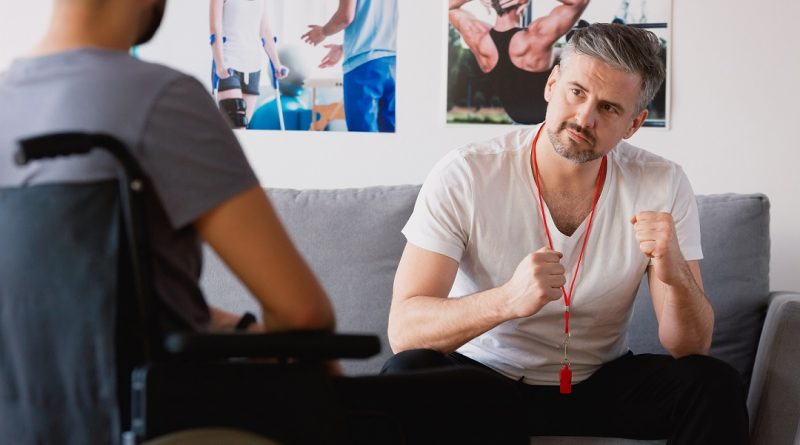If you’ve faced an injury or met an accident, there are very high chances that it had some effect on you mentally as well. It is common for people who have faced an injury to encounter mental duress until they are healed. It is an exhausting and frustrating task to recover completely from your physical and mental injury. One might begin to develop feelings of sadness, anger, shame, fear, depression, and isolation in the meanwhile. Although recovering mentally can be much harder than recovering physically, both are equally important.
Below are some ways to ensure that your mental health remains intact during the recovery process. Make sure you read it till the end to understand everything clearly.
Embrace your feelings: If your injury is serious, it might mean that you will not be able to participate in sports activities, and your normal routine will not be so normal for some time. There are five stages of grief that a patient might undergo mentally during a recovery phase. These include denial, anger, bargaining, depression, and acceptance. It is not necessary that every patient would go through them in the same order. Besides, it is normal to shift back and forth in these phases while recovering.

Corporate Wellness App
CircleCare
Take Control Where Possible: Many people require recovery for their injuries, be it a sports accident, a surgery, childbirth, or injuries retained after a road accident. In any case, your routine will be disturbed, and your mere self-dependency will not remain intact. In such scenarios, you might feel devastated, powerless, or both. What you need to do in such a situation is based on the circumstances. No one knows your body as well as you do, and you ought to use that. For instance, only you can gauge when and how much you can push your body and when is it time to allow it to rest a bit.
Structuring your routine is majorly helpful in such scenarios. Understandably, you can no longer follow your normal routine due to your injury; hence you must create a new normal for yourself. It would be best if you created a routine for yourself, for instance, set times for waking up engaging in physical and relaxing activities during the day.
Get Your Goals Straight: If you are an athlete facing an injury, this will come to you naturally, but if that’s not the case, you still need to focus on it as it is a major help and listen to the whiplash doctor. Setting your goals will put you in control of your situation and allow a more focused and speedy recovery. Besides, it also boosts self-esteem and keeps the momentum maintained. It is wise to use the SMART goal technique, which basically refers to setting goals that are Specific, Measurable, Attainable, Relevant and Time-bound.
- Specific Goal: I will walk two miles in half an hour.
- Measurable Goal: I will keep track of my steps and speed through an app.
- Attainable Goal: I used to walk 2 miles in 30 minutes before my injury, and I’ll do that again once I’ve healed.
- Relevant Goal: I like walking; hence, walking around my neighborhood would be great for my physical and mental health.
- Time-bound Goal: I’ll follow my doctor’s instructions and heal in the recommended time. I’ll push myself harder and reach my Goal in 8 weeks with exponential progress.
Focus on The Present: it is normal for a person undergoing recovery to want to heal right away. But what’s important is that you must realize and accept that it takes time, and you will need to focus on the moment at hand to make the upcoming ones better. You need to work hard and push yourself in the present to be able to recover completely in future.
It’s Okay To Ask For Help: Many injuries can affect the brain adversely and even cause PTSD. Injuries caused by road accidents such as vehicle-pedestrian accidents, motorbike or car accidents, gunshot wounds, and some others can easily cause PTSD. If not so, it would at least cause trauma, but if PTSD is left untreated, it slowly limits recovery and the brain’s functionality. It might lead the patient to the stage where they find daily activities hard to get done.
Some indicators of knowing that the PTSD has gone into a worse stage are; reliving the event frequently through nightmares, flashbacks and memories which you are unable to control, a heightened startle response, feeling numb emotionally regarding the specific event, inability to concentrate, insomnia, irrational behavior, or the unwillingness to think about the event.
Visualize: Studies have found that imagining an action and then actually performing it in real-time will stimulate the same parts of the brain. An effective technique is to visualize yourself in a healthy state. For instance, if you have a broken femur, imagine yourself running along the beach or hiking on a trail with two healthy legs allowing you to progress smoothly. Another technique is to visualize the healing itself; for example, visualizing broken bones growing and becoming one again or visualizing torn muscles knitting back together. Lastly, yet another way is to visualize warm colors to promote a sense of warmth and promote healing in a specific body area.
Cultivate Optimism: Injuries bring great challenges in our lives and often push us into negative thoughts which will do nothing other than slow down our recovery. It is recommended to form a healing phrase or words, a sort of mantra which you chant when the pain or demotivation becomes overwhelming. These do not have to be complex sentences, but something as simple as “My health comes above everything else.” or “I will heal faster and come back stronger.” You can also opt for other ways of cultivating your optimism by keeping a gratitude diary or doing anything that helps you feel good. It can be something as trivial as watching a funny movie, reading a book, or even talking to your whiplash doctor or a friend!
You must remember that mental health is also important as physical health is. You shouldn’t risk your mental health when concerning your physical one. If you’re injured, you must stay calm and think about the things you can do to recover from it. Instead of being depressed or stressed, work things out for you and you’ll recover soon. Try to follow our above mentioned tips, it’ll help you recover mentally, faster and easier.








